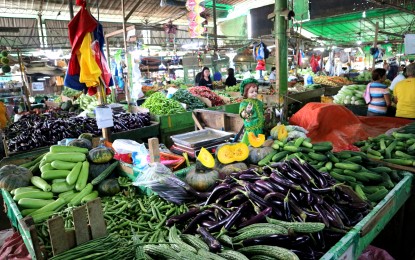
MANILA – Headline inflation further decelerated to 6.6 percent in April from 7.6 percent in March, the Philippine Statistics Authority (PSA) said Friday.
The inflation rate settled within the Bangko Sentral ng Pilipinas' 6.3 to 7.1 percent forecast range for the period.
However, it is higher than the inflation rate in April last year, which was at 4.9 percent.
Meanwhile, core inflation which excludes volatile oil and food items, likewise went down to 7.9 percent from March's 8.0 percent.
In a press briefing, PSA Undersecretary and National Statistician Dennis Mapa said year-to-date, headline inflation settled at 7.9 percent.
Mapa said the downtrend could be attributed to the slower price increases in prices of food and non-alcoholic beverages at 7.9 percent, from 9.3 percent the previous month.
This was mainly due to the slowdown in the inflation of vegetables, fish and other seafood, and meat.
Mapa said the price increase of vegetables, tubers and others was at 10 percent from 20 percent in March.
Inflation of fish and other seafood likewise slowed to 7 percent from 9.9 percent, while meat inflation was at 4.2 percent from 4.6 percent the previous month.
Mapa said however that rice inflation recorded an uptick to 2.9 percent from 2.6 percent a month earlier.
Lower transport inflation which hit 2.6 percent from 5.3 percent, housing, water, electricity, gas and other fuels with an inflation of 6.5 percent from 7.6 percent, also contributed to the downtrend in headline inflation.
The inflation rate in National Capital Region (NCR) meanwhile, also decelerated to 7.1 percent in April from 7.8 percent in March.
Inflation in areas outside NCR also cooled down to 6.5 percent from 7.5 percent a month ago.
Mapa said inflation rate for the country's bottom 30 percent households also slowed to 7.4 percent from the previous month's 8.8 percent.
In a statement, Finance Secretary Benjamin Diokno said the lower inflation indicates "that we are on track to managing inflation to within target sometime in the fourth quarter, if not sooner, and near the midpoint of the target range of 2.0 to 4.0 percent by next year."
"The consistent decline in inflation rate over the past three months clearly demonstrates that the whole-of-government approach to tackling inflationary pressures is bearing fruit," said Diokno.
The National Economic and Development Authority (NEDA) meanwhile assured that it will continue to push for measures that will protect the purchasing power of Filipinos.
NEDA Secretary Arsenio Balisacan noted that following the lower inflation in April, "NEDA is optimistic that the downward trend will continue and settle further within the government’s outlook."
The Development Budget Coordination Committee (DBCC) earlier revised its 2023 inflation outlook to 5 to 7 percent from the previous assumption of 2.5 to 4.5 percent, in view of persisting high prices of food, energy, and transport costs.
Balisacan noted that the government recognizes the risks to the inflation outlook to remain tilted toward the upside amid potential transport fare increases, wage adjustments, and domestic food supply pressures amidst the threat of El Niño and the resurgence of African Swine Flu.
He said the Inter-Agency Committee on Inflation and Market Outlook (IAC-IMO) continues to monitor and facilitates regular and systematic data-sharing to provide timely recommendations to the President and relevant agencies on measures to mitigate inflation and ensure sufficient food and energy supply.
"It is important to design policies and interventions to help those that will be affected by El Niño, through the provision of seeds or seedlings of non-water- loving crops or crop varieties. Additionally, the government must remain proactive in curbing animal disease outbreaks through stronger border protection and monitoring," Balisacan said.
Remain committed
Department of Budget and Management (DBM) Secretary Amenah F. Pangandaman welcomed the development, saying that the latest data showed that the country’s inflation rate continues a downward trend.
“PSA’s data goes to show that our projection of a decelerating inflation rate will continue. And hopefully, we will be able to achieve our Medium Term Fiscal Framework (MTFF) target range of 2.0 to 4.0 percent between 2024 and 2028,” she said in a statement.
“Nevertheless, we will remain committed to pushing for the implementation of immediate and medium-term strategies to cushion the impact of inflation on our consumers, including food, transport and energy security,” she added.
Pangandaman said the steady decline in inflation rate in the past three months strongly and clearly demonstrates the effectiveness of the whole-of-government approach implemented by the administration of President Ferdinand R. Marcos Jr., in handling inflationary pressures and mitigating its effects. (PNA)
